耶鲁大学校长开学典礼致辞
- 格式:doc
- 大小:71.00 KB
- 文档页数:8
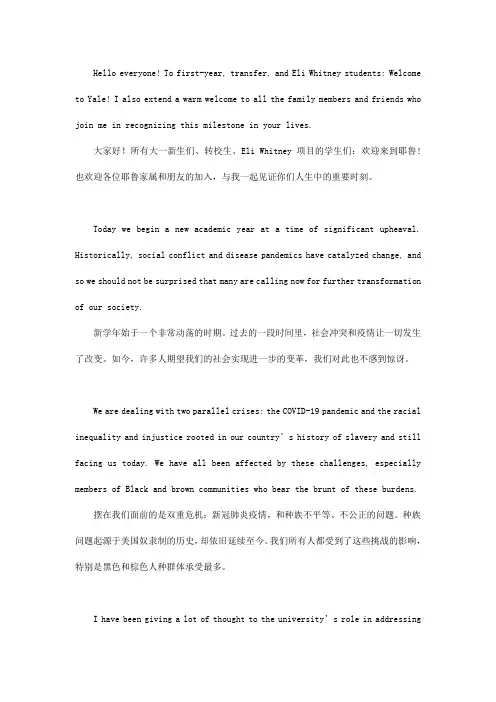
Hello everyone! To first-year, transfer, and Eli Whitney students: Welcome to Yale! I also extend a warm welcome to all the family members and friends who join me in recognizing this milestone in your lives.大家好!所有大一新生们、转校生、Eli Whitney项目的学生们:欢迎来到耶鲁!也欢迎各位耶鲁家属和朋友的加入,与我一起见证你们人生中的重要时刻。
Today we begin a new academic year at a time of significant upheaval. Historically, social conflict and disease pandemics have catalyzed change, and so we should not be surprised that many are calling now for further transformation of our society.新学年始于一个非常动荡的时期。
过去的一段时间里,社会冲突和疫情让一切发生了改变。
如今,许多人期望我们的社会实现进一步的变革,我们对此也不感到惊讶。
We are dealing with two parallel crises: the COVID-19 pandemic and the racial inequality and injustice rooted in our country’s history of slavery and still facing us today. We have all been affected by these challenges, especially members of Black and brown communities who bear the brunt of these burdens.摆在我们面前的是双重危机:新冠肺炎疫情,和种族不平等、不公正的问题。
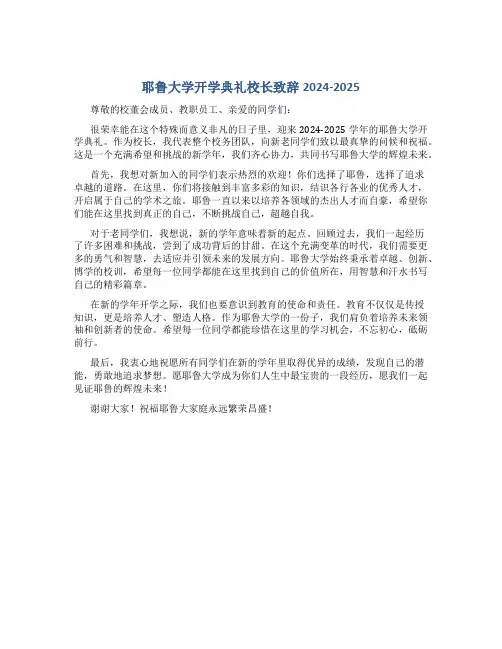
耶鲁大学开学典礼校长致辞2024-2025
尊敬的校董会成员、教职员工、亲爱的同学们:
很荣幸能在这个特殊而意义非凡的日子里,迎来2024-2025学年的耶鲁大学开学典礼。
作为校长,我代表整个校务团队,向新老同学们致以最真挚的问候和祝福。
这是一个充满希望和挑战的新学年,我们齐心协力,共同书写耶鲁大学的辉煌未来。
首先,我想对新加入的同学们表示热烈的欢迎!你们选择了耶鲁,选择了追求
卓越的道路。
在这里,你们将接触到丰富多彩的知识,结识各行各业的优秀人才,开启属于自己的学术之旅。
耶鲁一直以来以培养各领域的杰出人才而自豪,希望你们能在这里找到真正的自己,不断挑战自己,超越自我。
对于老同学们,我想说,新的学年意味着新的起点。
回顾过去,我们一起经历
了许多困难和挑战,尝到了成功背后的甘甜。
在这个充满变革的时代,我们需要更多的勇气和智慧,去适应并引领未来的发展方向。
耶鲁大学始终秉承着卓越、创新、博学的校训,希望每一位同学都能在这里找到自己的价值所在,用智慧和汗水书写自己的精彩篇章。
在新的学年开学之际,我们也要意识到教育的使命和责任。
教育不仅仅是传授
知识,更是培养人才、塑造人格。
作为耶鲁大学的一份子,我们肩负着培养未来领袖和创新者的使命。
希望每一位同学都能珍惜在这里的学习机会,不忘初心,砥砺前行。
最后,我衷心地祝愿所有同学们在新的学年里取得优异的成绩,发现自己的潜能,勇敢地追求梦想。
愿耶鲁大学成为你们人生中最宝贵的一段经历,愿我们一起见证耶鲁的辉煌未来!
谢谢大家!祝福耶鲁大家庭永远繁荣昌盛!。
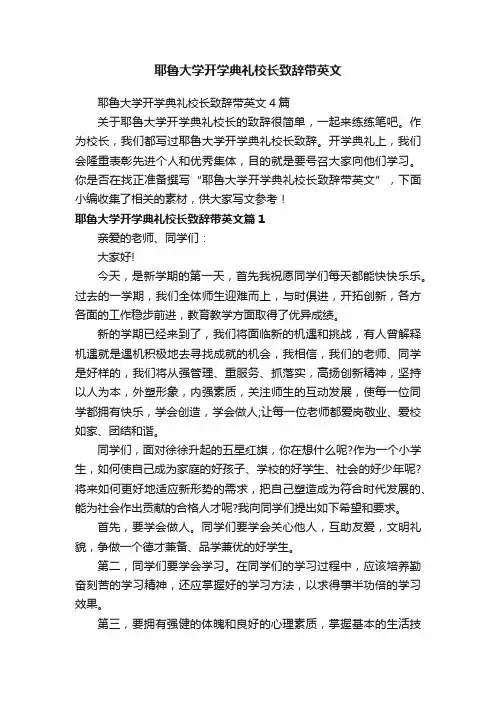
耶鲁大学开学典礼校长致辞带英文耶鲁大学开学典礼校长致辞带英文4篇关于耶鲁大学开学典礼校长的致辞很简单,一起来练练笔吧。
作为校长,我们都写过耶鲁大学开学典礼校长致辞。
开学典礼上,我们会隆重表彰先进个人和优秀集体,目的就是要号召大家向他们学习。
你是否在找正准备撰写“耶鲁大学开学典礼校长致辞带英文”,下面小编收集了相关的素材,供大家写文参考!耶鲁大学开学典礼校长致辞带英文篇1亲爱的老师、同学们:大家好!今天,是新学期的第一天,首先我祝愿同学们每天都能快快乐乐。
过去的一学期,我们全体师生迎难而上,与时俱进,开拓创新,各方各面的工作稳步前进,教育教学方面取得了优异成绩。
新的学期已经来到了,我们将面临新的机遇和挑战,有人曾解释机遇就是遇机积极地去寻找成就的机会,我相信,我们的老师、同学是好样的,我们将从强管理、重服务、抓落实,高扬创新精神,坚持以人为本,外塑形象,内强素质,关注师生的互动发展,使每一位同学都拥有快乐,学会创造,学会做人;让每一位老师都爱岗敬业、爱校如家、团结和谐。
同学们,面对徐徐升起的五星红旗,你在想什么呢?作为一个小学生,如何使自己成为家庭的好孩子、学校的好学生、社会的好少年呢?将来如何更好地适应新形势的需求,把自己塑造成为符合时代发展的、能为社会作出贡献的合格人才呢?我向同学们提出如下希望和要求。
首先,要学会做人。
同学们要学会关心他人,互助友爱,文明礼貌,争做一个德才兼备、品学兼优的好学生。
第二,同学们要学会学习。
在同学们的学习过程中,应该培养勤奋刻苦的学习精神,还应掌握好的学习方法,以求得事半功倍的学习效果。
第三,要拥有强健的体魄和良好的心理素质,掌握基本的生活技能,培养健康的审美情趣,发展特长,为将来的发展打下良好的基础。
学习成绩达到更高、更好、更上一层楼。
第四,要团结友爱,遵纪守法。
同学们要为加强校风和班风建设作出贡献,要增强集体意识,培养团队精神,文明礼貌,团结互助,争做学校的好学生。
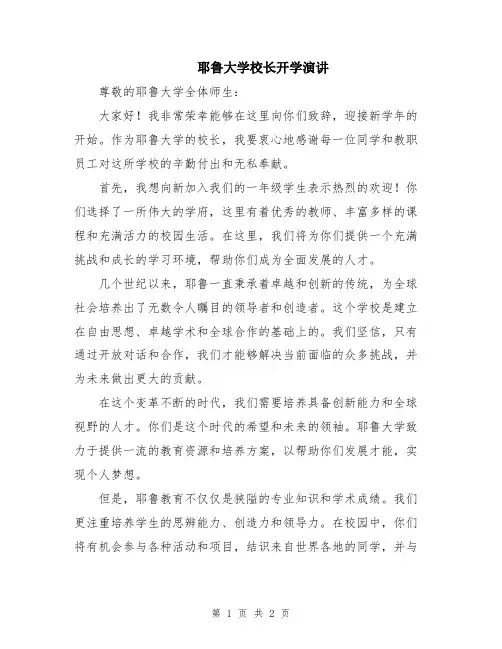
耶鲁大学校长开学演讲尊敬的耶鲁大学全体师生:大家好!我非常荣幸能够在这里向你们致辞,迎接新学年的开始。
作为耶鲁大学的校长,我要衷心地感谢每一位同学和教职员工对这所学校的辛勤付出和无私奉献。
首先,我想向新加入我们的一年级学生表示热烈的欢迎!你们选择了一所伟大的学府,这里有着优秀的教师、丰富多样的课程和充满活力的校园生活。
在这里,我们将为你们提供一个充满挑战和成长的学习环境,帮助你们成为全面发展的人才。
几个世纪以来,耶鲁一直秉承着卓越和创新的传统,为全球社会培养出了无数令人瞩目的领导者和创造者。
这个学校是建立在自由思想、卓越学术和全球合作的基础上的。
我们坚信,只有通过开放对话和合作,我们才能够解决当前面临的众多挑战,并为未来做出更大的贡献。
在这个变革不断的时代,我们需要培养具备创新能力和全球视野的人才。
你们是这个时代的希望和未来的领袖。
耶鲁大学致力于提供一流的教育资源和培养方案,以帮助你们发展才能,实现个人梦想。
但是,耶鲁教育不仅仅是狭隘的专业知识和学术成绩。
我们更注重培养学生的思辨能力、创造力和领导力。
在校园中,你们将有机会参与各种活动和项目,结识来自世界各地的同学,并与教师、学者和专家们进行深入交流。
通过这些经历,你们将能够培养多元思维、团队合作和解决问题的能力。
另外,耶鲁大学也高度重视学生的身心健康。
我们秉持着“全人教育”的理念,关注学生的身心平衡和发展。
我们将为你们提供丰富的体育运动、文化艺术和社会活动,帮助你们建立积极的生活方式和健康的人际关系。
在过去的一年里,我们全球各地面临了巨大的挑战。
疫情的爆发给我们的生活和学习带来了巨大的冲击。
然而,我们展现了耶鲁大学的韧性和创新力。
在面对困难和变化时,我们迅速采取了有效的措施,保障了学生和教职员工的健康与安全。
同时,我们推出了在线教学和远程研究项目,保证了学术的连续性和教育的质量。
今天,我们在这里庆祝耶鲁大学迎来了新的学期。
尽管疫情的挑战依然存在,但我相信我们有能力应对一切困难。
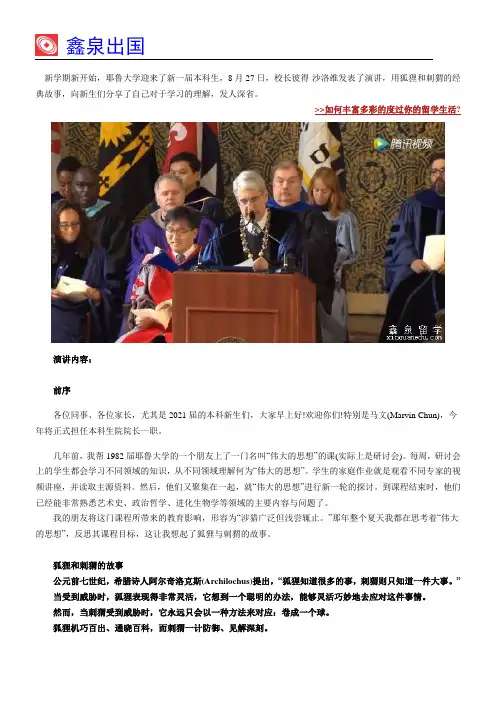
新学期新开始,耶鲁大学迎来了新一届本科生,8月27日,校长彼得·沙洛维发表了演讲,用狐狸和刺猬的经典故事,向新生们分享了自己对于学习的理解,发人深省。
>>如何丰富多彩的度过你的留学生活?
演讲内容:
前序
各位同事、各位家长,尤其是2021届的本科新生们,大家早上好!欢迎你们!特别是马文(Marvin Chun),今年将正式担任本科生院院长一职。
几年前,我帮1982届耶鲁大学的一个朋友上了一门名叫“伟大的思想”的课(实际上是研讨会)。
每周,研讨会上的学生都会学习不同领域的知识,从不同领域理解何为“伟大的思想”。
学生的家庭作业就是观看不同专家的视频讲座,并读取主源资料。
然后,他们又聚集在一起,就“伟大的思想”进行新一轮的探讨。
到课程结束时,他们已经能非常熟悉艺术史、政治哲学、进化生物学等领域的主要内容与问题了。
我的朋友将这门课程所带来的教育影响,形容为“涉猎广泛但浅尝辄止。
”那年整个夏天我都在思考着“伟大的思想”,反思其课程目标,这让我想起了狐狸与刺猬的故事。
狐狸和刺猬的故事
公元前七世纪,希腊诗人阿尔奇洛克斯(Archilochus)提出,“狐狸知道很多的事,刺猬则只知道一件大事。
”
当受到威胁时,狐狸表现得非常灵活,它想到一个聪明的办法,能够灵活巧妙地去应对这件事情。
然而,当刺猬受到威胁时,它永远只会以一种方法来对应:卷成一个球。
狐狸机巧百出、通晓百科,而刺猬一计防御、见解深刻。
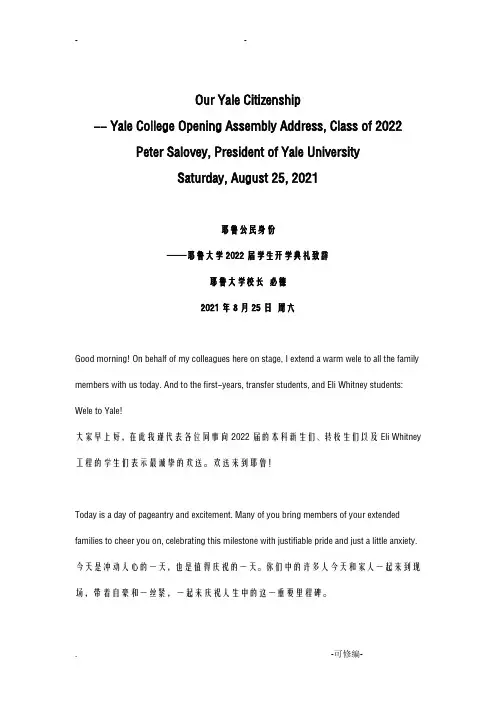
Our Yale Citizenship-- Yale College Opening Assembly Address, Class of 2022 Peter Salovey, President of Yale UniversitySaturday, August 25, 2021耶鲁公民身份——耶鲁大学2022届学生开学典礼致辞耶鲁大学校长必德2021年8月25日周六Good morning! On behalf of my colleagues here on stage, I extend a warm wele to all the family members with us today. And to the first-years, transfer students, and Eli Whitney students: Wele to Yale!大家早上好,在此我谨代表各位同事向2022届的本科新生们、转校生们以及Eli Whitney 工程的学生们表示最诚挚的欢送。
欢送来到耶鲁!Today is a day of pageantry and excitement. Many of you bring members of your extended families to cheer you on, celebrating this milestone with justifiable pride and just a little anxiety.今天是冲动人心的一天,也是值得庆祝的一天。
你们中的许多人今天和家人一起来到现场,带着自豪和一丝紧,一起来庆祝人生中的这一重要里程碑。
Today is also a day of Yale traditions. You will encounter countless wonderful rituals here, some recent and some quite old. Many are steeped in history yet remain popular, even beloved, among Yalies. (And remember, you are now a Yalie!)今天也是耶鲁诸多传统中的一天。
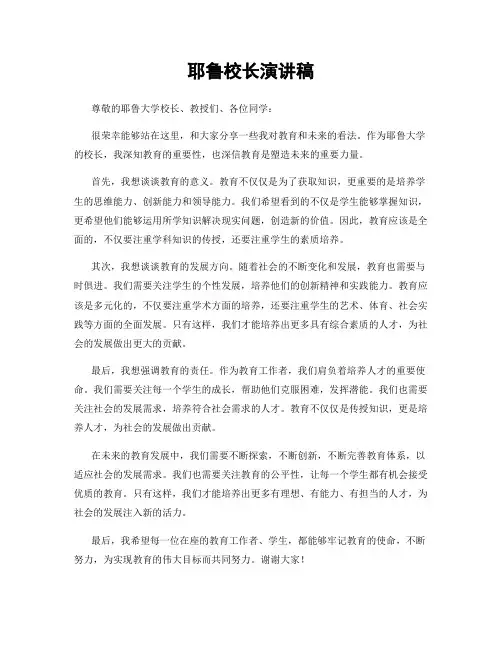
耶鲁校长演讲稿尊敬的耶鲁大学校长、教授们、各位同学:很荣幸能够站在这里,和大家分享一些我对教育和未来的看法。
作为耶鲁大学的校长,我深知教育的重要性,也深信教育是塑造未来的重要力量。
首先,我想谈谈教育的意义。
教育不仅仅是为了获取知识,更重要的是培养学生的思维能力、创新能力和领导能力。
我们希望看到的不仅是学生能够掌握知识,更希望他们能够运用所学知识解决现实问题,创造新的价值。
因此,教育应该是全面的,不仅要注重学科知识的传授,还要注重学生的素质培养。
其次,我想谈谈教育的发展方向。
随着社会的不断变化和发展,教育也需要与时俱进。
我们需要关注学生的个性发展,培养他们的创新精神和实践能力。
教育应该是多元化的,不仅要注重学术方面的培养,还要注重学生的艺术、体育、社会实践等方面的全面发展。
只有这样,我们才能培养出更多具有综合素质的人才,为社会的发展做出更大的贡献。
最后,我想强调教育的责任。
作为教育工作者,我们肩负着培养人才的重要使命。
我们需要关注每一个学生的成长,帮助他们克服困难,发挥潜能。
我们也需要关注社会的发展需求,培养符合社会需求的人才。
教育不仅仅是传授知识,更是培养人才,为社会的发展做出贡献。
在未来的教育发展中,我们需要不断探索,不断创新,不断完善教育体系,以适应社会的发展需求。
我们也需要关注教育的公平性,让每一个学生都有机会接受优质的教育。
只有这样,我们才能培养出更多有理想、有能力、有担当的人才,为社会的发展注入新的活力。
最后,我希望每一位在座的教育工作者、学生,都能够牢记教育的使命,不断努力,为实现教育的伟大目标而共同努力。
谢谢大家!以上就是我的演讲稿,希望能够对大家有所启发。
感谢大家的聆听。
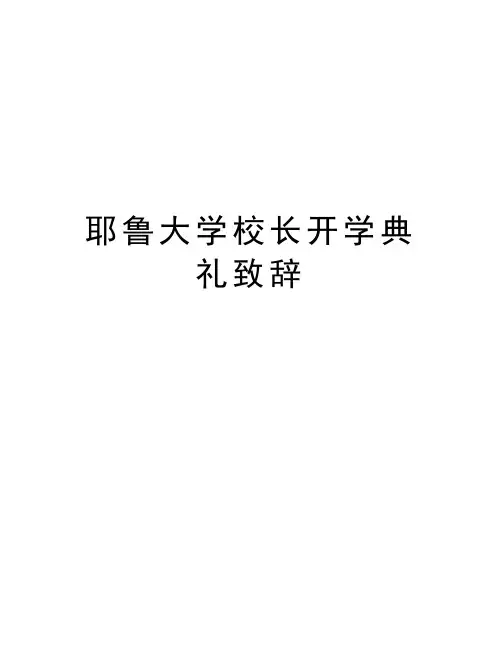
耶鲁大学校长开学典礼致辞Our Yale Citizenship-- Yale College Opening Assembly Address, Class of 2022 Peter Salovey, President of Yale UniversitySaturday, August 25, 2018耶鲁公民身份——耶鲁大学2022届学生开学典礼致辞耶鲁大学校长苏必德2018年8月25日周六Good morning! On behalf of my colleagues here on stage, I extend a warm welcome to all the family members with us today. And to the first-years, transfer students, and Eli Whitney students: Welcome to Yale!大家早上好,在此我谨代表各位同事向2022届的本科新生们、转校生们以及Eli Whitney项目的学生们表示最诚挚的欢迎。
欢迎来到耶鲁!Today is a day of pageantry and excitement. Many of you bring members of your extended families to cheer you on, celebrating this milestone with justifiable pride and just a little anxiety.今天是激动人心的一天,也是值得庆祝的一天。
你们中的许多人今天和家人一起来到现场,带着自豪和一丝紧张,一起来庆祝人生中的这一重要里程碑。
Today is also a day of Yale traditions. You will encounter countless wonderful rituals here, some recent and some quite old. Many are steeped in history yet remain popular, even beloved, among Yalies. (And remember, you are now a Yalie!)今天也是耶鲁诸多传统中的一天。
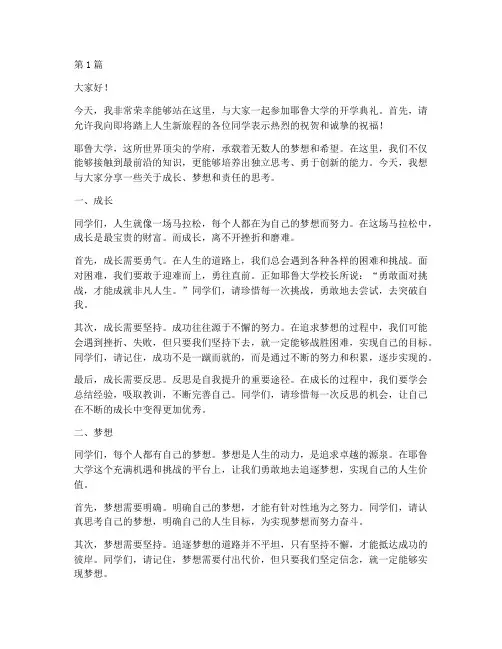
第1篇大家好!今天,我非常荣幸能够站在这里,与大家一起参加耶鲁大学的开学典礼。
首先,请允许我向即将踏上人生新旅程的各位同学表示热烈的祝贺和诚挚的祝福!耶鲁大学,这所世界顶尖的学府,承载着无数人的梦想和希望。
在这里,我们不仅能够接触到最前沿的知识,更能够培养出独立思考、勇于创新的能力。
今天,我想与大家分享一些关于成长、梦想和责任的思考。
一、成长同学们,人生就像一场马拉松,每个人都在为自己的梦想而努力。
在这场马拉松中,成长是最宝贵的财富。
而成长,离不开挫折和磨难。
首先,成长需要勇气。
在人生的道路上,我们总会遇到各种各样的困难和挑战。
面对困难,我们要敢于迎难而上,勇往直前。
正如耶鲁大学校长所说:“勇敢面对挑战,才能成就非凡人生。
”同学们,请珍惜每一次挑战,勇敢地去尝试,去突破自我。
其次,成长需要坚持。
成功往往源于不懈的努力。
在追求梦想的过程中,我们可能会遇到挫折、失败,但只要我们坚持下去,就一定能够战胜困难,实现自己的目标。
同学们,请记住,成功不是一蹴而就的,而是通过不断的努力和积累,逐步实现的。
最后,成长需要反思。
反思是自我提升的重要途径。
在成长的过程中,我们要学会总结经验,吸取教训,不断完善自己。
同学们,请珍惜每一次反思的机会,让自己在不断的成长中变得更加优秀。
二、梦想同学们,每个人都有自己的梦想。
梦想是人生的动力,是追求卓越的源泉。
在耶鲁大学这个充满机遇和挑战的平台上,让我们勇敢地去追逐梦想,实现自己的人生价值。
首先,梦想需要明确。
明确自己的梦想,才能有针对性地为之努力。
同学们,请认真思考自己的梦想,明确自己的人生目标,为实现梦想而努力奋斗。
其次,梦想需要坚持。
追逐梦想的道路并不平坦,只有坚持不懈,才能抵达成功的彼岸。
同学们,请记住,梦想需要付出代价,但只要我们坚定信念,就一定能够实现梦想。
最后,梦想需要分享。
在实现自己的梦想的同时,我们也要关注身边的人,帮助他们实现梦想。
同学们,让我们携手共进,共同为实现梦想而努力。
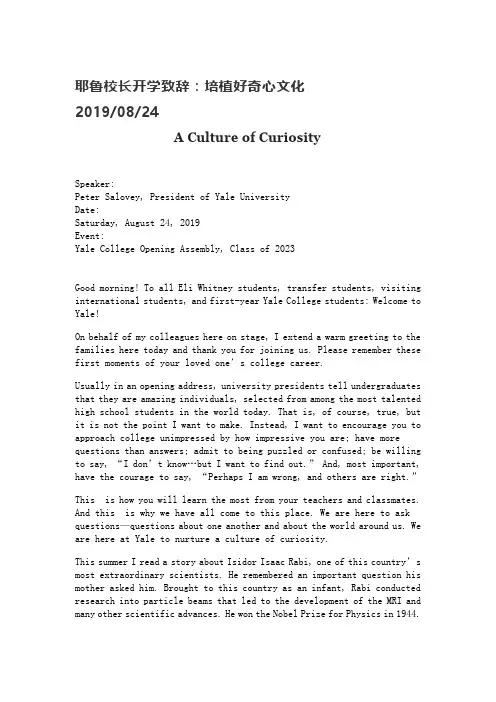
耶鲁校长开学致辞:培植好奇心文化2019/08/24A Culture of CuriositySpeaker:Peter Salovey, President of Yale UniversityDate:Saturday, August 24, 2019Event:Yale College Opening Assembly, Class of 2023Good morning! To all Eli Whitney students, transfer students, visiting international students, and first-year Yale College students: Welcome to Yale!On behalf of my colleagues here on stage, I extend a warm greeting to the families here today and thank you for joining us. Please remember these first moments of your loved one’s college career.Usually in an opening address, university presidents tell undergraduates that they are amazing individuals, selected from among the most talented high school students in the world today. That is, of course, true, but it is not the point I want to make. Instead, I want to encourage you to approach college unimpressed by how impressive you are; have more questions than answers; admit to being puzzled or confused; be willing to say, “I don’t know…but I want to find out.” And, most important, have the courage to say, “Perhaps I am wrong, and others are right.”This is how you will learn the most from your teachers and classmates. And this is why we have all come to this place. We are here to ask questions—questions about one another and about the world around us. We are here at Yale to nurture a culture of curiosity.This summer I read a story about Isidor Isaac Rabi, one of this country’s most extraordinary scientists. He remembered an important question his mother asked him. Brought to this country as an infant, Rabi conducted research into particle beams that led to the development of the MRI and many other scientific advances. He won the Nobel Prize for Physics in 1944.Rabi’s parents ran a small grocery store in Brooklyn. His mother had no formal education. The other moms, he remembered, asked their children every afternoon if they had learned anything in school. “Not my mother,” he recalled. “She always asked me a different question. ‘Izzy,’ she would say, ‘did you ask a good question today?’” He believed her reminder to ask good questions helped set him on a path to becoming a distinguished scientist.So, to all the families here today, when you call your Yale students—when you ask them about their classes and their roommates and the food—remember also to ask them about their questions.Imagine all the great discoveries that have come from asking a question—from Newton’s theory of gravity to the astonishing breakthroughs in quantum science—some of which are happening here at Yale. When a musician experiments with a new melody, or a sociologist observes a social interaction, they ask “why” and “what would happen if…?” Their curiosity lights up our world and points us in new directions. Self-discoveries come from asking questions, too. What do you learn when you ask yourself, “Why do I believe that?” or “Why did I do that?”I think of these lines from the poet Billy Collins: “the trouble with poetry is / that it e ncourages the writing of more poetry.”[i]I would say the same of asking questions. One leads to another, which opens doors to still another. Sometimes our questions lead us to a dead-end. We realize the question we asked wasn’t quite right, and a door clo ses. But along the way we have learned something. Perhaps in the future we will ask better questions.In a well-known scene in the movie The Pink Panther, Inspector Clouseau checks into a hotel in Germany. He sees a dachshund in the lobby and asks the hote l owner, “Does your dog bite?” The owner replies, “No.” When Clouseau goes to pet the dog, it bites his hand—hard! Shocked, he tells the hotel owner, “I thought you said your dog doesn’t bite!” The owner responds, “That is not my dog.” Clouseau simply hadn't asked the right question.Years ago, I co-taught an undergraduate seminar. One of the questions on the application to the course was, “What is the most important thing you’ve changed your mind about?” We were surprised that quite a few students had not changed their minds about anything at all! We decided to accept to the class only students who had changed their minds about something important.Be willing to change your mind. Ask questions and embrace Yale’s culture of curiosity. Be open to different viewpoints and experiences, and see them as opportunities to learn—even if sometimes you get your hand bit.I am a social psychologist. And as a graduate student at Yale, my curiosity was sparked by the study of emotions, and by a question my undergraduate a dvisor first asked me: “Peter, why do you think humans even have emotions? What do they do for us?” One of my major areas of research ever since then has been emotional intelligence.In our earliest work, we described emotional intelligence as a set of skills that one could learn that would help you extract the information—the “data”—contained in emotions, either your own or those of another person. After a few years of research, it was obvious to me and my collaborators that we weren’t asking exactly th e right questions. We needed to be able to show that emotional intelligence predicted outcomes in life—the ability to form friendships, succeed in school, work as part of a team, and the like.Trouble was, how do you go about the skills of emotional intelligence? We asked ourselves a series of questions starting with, “How are personal characteristics typically measured by psychologists? The answer is by asking people to rate themselves—IT is called “self-reports.” But this led to approaches that disappointed us: How would someone know if they were the kind of person who was especially good at identifying, understanding, managing, and using emotions? Perhaps thinking you had spectacular emotional intelligence was a sign of not having much of it at all!So that door closed, and we asked ourselves another question: If we wanted to know if someone possessed the skills of a great baseball player—hitting, throwing, and catching a ball; running bases effectively—how confident would we be of self-report? Not very: All ball players think they are the next A-Rod! When I was a child, I thought I would be the next Carl Yastrzemski when playing in the backyard with my brother, but, in fact, I barely got out of Little League with my pride intact.Why would emotional intelligence be any different than baseball? If we wanted to know whether someone had high E.I., we needed to assess these skills as abilities. And what would an ability measure of emotional intelligence even look like? Asking ourselves these questions led to an answer that made sense, and our ability-based measure of emotional intelligence has now been used in hundreds of studies. Knowing that wedidn’t have all the answers and taking an inquisitive, curious attitude allowed us the opportunity to create something relatively new.So, what questions will you ask? What will spark your curiosity?Not long ago, I received an email from a very proud Yale College parent. He told me about his son, who heard seventy-seven different speakers during his first year at Yale. Seventy-seven! He had learned from thinkers and leaders across the political spectrum. He attended events organized by a wide range of campus organizations. What a way to spend your first year! Could you do this and not change your mindabout something important?And it turns out this student is also very good at asking questions: in the past year, he has interviewed dozens of people—scholars and activists, journalists and entrepreneurs from many different sectors. Like so many students, faculty, and staff, he is nurturing a culture of curiosity at Yale.Indeed, the Yalies who have come before you have asked a dazzling array of questions. I think of the pioneers of coeducation. Fifty years ago, in 1969, 588 women came to study in Yale College. They entered what had long been an all-male institution, and they asked questions that hadn’t been asked before. We will commemorate this milestone—along with the 150th anniversary of women entering Yale'se School of Art—throughout this year.I think of Margaret Warner, Class of 1971. An award-winning journalist, she knows how to ask brilliant questions. She has reported from war zones for decades, witnessing history firsthand and trying to understand our world.I think, too, of Alice Young, Class of 1971. She looked around this campus and asked why there weren’t more students from public schools, so she became an ambassador for Yale back in her home state of Hawaii. She was also one of the founders of the Asian American Students Alliance, which also celebrates its 50th anniversary this year.And we remember other important anniversaries and the curious students who were part of these changes. In 1969, thanks to student efforts, the Afro-American Cultural Center, known as “the House,” opened, and what is now the Department of African American Studies was created. And that same year, students established the Yale chapter of Movimiento Estudiantil Chicano de Aztlán, also known as MEChA. I believe we owe a debt of gratitude to all the courageous pioneers, throughout our history, who have made Yale what it is today.What questions will you ask? And how will your questions transform Yale and improve our world?Your time at Yale is an unparalleled opportunity to engage with a wide range of people, ideas, and experiences. More than at any other point in your life, you will have the means and the opportunity to hear from—and converse with—world-renowned experts in many fields. You will have the chance to create knowledge through rigorous research, and attend arts, literary, and athletics events that challenge and inspire you. You will spend time with peers whose lives have been wildly different from your own.What if you nurtured your own curiosity by pushing yourself beyond the familiar and the comfortable? What would that look like?It might mean attending a talk on a topic you don’t know much about or by someone who doesn’t share your beliefs. Or conducting research in a Yale laboratory or collaborating on an exhibit at one of our amazing museums. Or perhaps your curiosity will be sparked by having coffee with a classmate who comes from a different part of the world or a different place on the political spectrum.And when you do these things, when you take advantage of the opportunities Yale makes possible, what questions will you ask?There is so much we do not know. Let us embrace, together, our humility—our willingness to admit what we have yet to discover. After all, if you knew all the answers, you would not need Yale. And if humanity knew all the answers, the world would not need Yale.So, what questions will you ask today? Tomorrow? The next day? And in the days, months, and years after I have shaken your hand at Commencement, let me know, let me know what questions you’ve asked that have changed your life.Good luck, Class of 2023![i] Billy Collins, “The Trouble with Poetry,” in The Trouble with Poetry and Other Poems(New York: Random House), 83.。
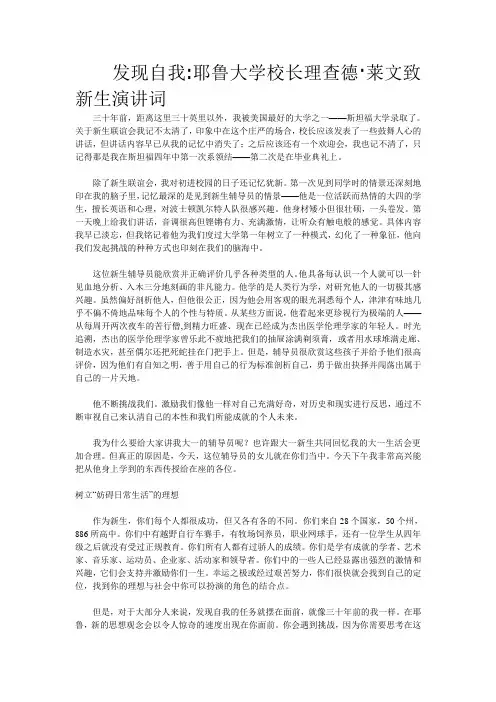
发现自我:耶鲁大学校长理查德·莱文致新生演讲词三十年前,距离这里三十英里以外,我被美国最好的大学之一——斯坦福大学录取了。
关于新生联谊会我记不太清了,印象中在这个庄严的场合,校长应该发表了一些鼓舞人心的讲话,但讲话内容早已从我的记忆中消失了;之后应该还有一个欢迎会,我也记不清了,只记得那是我在斯坦福四年中第一次系领结——第二次是在毕业典礼上。
-除了新生联谊会,我对初进校园的日子还记忆犹新。
第一次见到同学时的情景还深刻地印在我的脑子里,记忆最深的是见到新生辅导员的情景——他是一位活跃而热情的大四的学生,擅长英语和心理,对波士顿凯尔特人队很感兴趣。
他身材矮小但很壮硕,一头卷发。
第一天晚上给我们讲话,音调很高但铿锵有力、充满激情,让听众有触电般的感觉。
具体内容我早已淡忘,但我铭记着他为我们度过大学第一年树立了一种模式,幻化了一种象征,他向我们发起挑战的种种方式也印刻在我们的脑海中。
-这位新生辅导员能欣赏并正确评价几乎各种类型的人。
他具备每认识一个人就可以一针见血地分析、入木三分地刻画的非凡能力。
他学的是人类行为学,对研究他人的一切极其感兴趣。
虽然偏好剖析他人,但他很公正,因为他会用客观的眼光洞悉每个人,津津有味地几乎不偏不倚地品味每个人的个性与特质。
从某些方面说,他看起来更珍视行为极端的人——从每周开两次夜车的苦行僧,到精力旺盛、现在已经成为杰出医学伦理学家的年轻人。
时光追溯,杰出的医学伦理学家曾乐此不疲地把我们的抽屉涂满剃须膏,或者用水球堆满走廊、制造水灾,甚至偶尔还把死蛇挂在门把手上。
但是,辅导员很欣赏这些孩子并给予他们很高评价,因为他们有自知之明,善于用自己的行为标准剖析自己,勇于做出抉择并闯荡出属于自己的一片天地。
-他不断挑战我们。
激励我们像他一样对自己充满好奇,对历史和现实进行反思,通过不断审视自己来认清自己的本性和我们所能成就的个人未来。
-我为什么要给大家讲我大一的辅导员呢?也许跟大一新生共同回忆我的大一生活会更加合理。
耶鲁大学校长开学演讲导语:在耶鲁大学开学典礼上,校长应该准备什么样的发言材料呢?以下是小编为大家搜集的文章,欢迎大家阅读与借鉴!耶鲁大学校长开学演讲一同学们、老师们:今天我们在这尊师体育场隆重的举行新生开学典礼,首先,我代表昆山电力大学向新加入我校的各位新生们表示衷心的祝贺!你们选择了这里,这里同样也挑选了你们,让我们以最热烈的掌声庆贺彼此的这一相聚!我校是省内除××大学外面向全国招生省份最多、招生人数最多的高校。
我们的科技学院依然表现出强劲的生命力,吸引了大量学生报考。
我们的新同学来自全国23个省、自治区、直辖市及港澳台地区,因为共同的选择大家走到了一起,希望你们珍惜上学的机会,尽快适应学校的环境,找到适合自己的最佳起跑点。
我校是一所包含经、法、教、文、史、理、工、农、医、管理等十几个学科门类的综合性大学,是省重点建设高校,同时又具有较明显的办学特色。
学校目前占地两千多亩,校舍总建筑面积几十万多平方米,藏书几十万册;设有十几个二级学院,5个硕士点,60个本科专业。
现有教职工两千余人,其中院士6人,教授、副教授五百余人。
在科研上,学校已形成众多有区域特色的省、市重点学科,建有省级重点实验室、市级重点实验室和工程技术中心多个,组建了几十个研究所,近年来,学校在获得国家、省部级科研项目、在sci、ei上发表学术论文和科研经费上都有了较大幅度的增长,服务社会的能力进一步增强,产学研结合工作有了新的突破和进展。
在学生管理上,本着“以学生为本“的思想,更多地增强了服务与指导,切实地为同学们多办实事,学校通过国家贴息助学贷款、各种类型的奖学金和勤工助学岗位,帮助生活上有困难的同学,让同学通过自身努力积极争取,努力不使一个勤奋的学生因为贫困而失学或辍学。
为了使你们更好地成才,我们的学校和全体管理人员也将努力为大家的健康成长创造好的条件、营造好的氛围。
希望大家充分利用学校良好的资源和条件,抓住青春时光,勤奋向上,努力学习,在××大学这块土地上发现自我、找寻自身的价值和使命。
耶鲁大学2019开学季校长演讲:我希望你们求知若渴,倾听他人,尊重文化!几天前,耶鲁大学迎来了开学典礼,校长 Peter Salovey 为新入学的学子带来了精彩的演讲,下面就让我们一起来回顾一下演讲全文。
早上好!我谨代表各位在座耶鲁教职员工向出席典礼的学生家长表示热烈的欢迎。
新生们,转学生们,以及伊莱·惠特尼(Eli Whitney)项目的学生们,欢迎来到耶鲁!今天是盛大而激动人心的一天。
许多人怀揣着自豪和一些紧张,带着家人来为自己庆祝这一里程碑的时刻。
今天也是耶鲁大学的传统节日。
你会在这里遇到无数新的和旧的奇妙仪式。
许多仪式的历史已经颇为悠久,但仍深受耶鲁人的欢迎与喜爱。
记住,现在你是一名耶鲁人了!耶鲁大学的传统之一,是唱一首名为“灿烂的大学时光(Bright College Years)”的老歌。
它写于19世纪末,是我们非官方的、但得到广泛认可的校歌。
你会在许多校园活动中听到它,经常是由耶鲁合唱团和其他耶鲁乐队演唱,橄榄球比赛后由耶鲁铜管仪仗乐队演奏。
我是一名贝斯手,不是一名歌手。
不过希望你们能允许我来几句:这几句词是我在《灿烂的大学时光》中最喜欢的,而我的经验也证明,它们描绘的是真实的情景。
我想对于你们来说也将如此。
但今天,我希望用这首歌的最后几句歌词引入我的演讲,这几句歌词在校友会上很受欢迎,大家总是充满激情地唱着,还挥舞着手帕:这首歌由耶鲁大学1881届学生亨利·杜兰德(Henry Durand)创作,最后的几句是用来作为战斗口号的。
在那个年代,人们都像杜兰德一样,认为大多数耶鲁学生都来自同一个国家,信奉同一个上帝,直到最近几十年,大多数耶鲁人也都是白人、新教徒和美国人。
当然,50年前在耶鲁大学,他们也都是男性。
今天,耶鲁大学与杜兰德当时所认识的学校已经不同了。
我们欢迎来自世界各地、各种背景和各行各业的人。
我也很自豪能从耶鲁毕业,1986年,我在耶鲁大学获得了心理学博士学位。
耶鲁大学校长开学演讲When the World Is on Fire– Yale College Opening Assembly Address to Class of 2025Peter Salovey, President of Yale UniversitySaturday, August 28, 2021图片Good morning, everyone! To all Eli Whitney students, transfer students, visiting international students, and first-year Yale College students: Welcome to Yale!Let me begin by saying it is good, really good, to see you here today.And many families and loved ones are watching today’s ceremonies online. And on behalf of my colleagues here on stage and the entire Yale community, I want to extend a warm greeting to everyone joining us, wherever you are right now.This is a big moment – for you, our newest students, and for Yale.I am so glad you are here.Fifty-one years ago, university President Kingman Brewster delivered an address to the entering class of new undergraduates, welcoming them to Yale, just as I am doing now. At the time, the university was coming out of a very unusual year. (We can relate!) Just a few months earlier, in May 1970, tens of thousands of people from across the country had come to New Haven – and to Yale – to protest the trials of Bobby Seale and Ericka Huggins, leaders of the Black Panther Party, who were being tried for murder. Thousands of National Guard troops had been deployed to the city as some expected the protests to turn violent. The situation was extremely tense. Fortunately, reason prevailed, the protests remained largely peaceful, and no one was seriously injured, let alone killed.Still, these events rocked Yale’s campus. War was raging in Southeast Asia. Movements for civil rights and women’s rights were heading in new directions, and across society, it seemed like a younger generation was rising up to challenge the old guard. Against this backdrop, many people were wondering about Yale’s future. They were uncertain about the university’s role – its purpose – in a rapidly changing and unpredictable society.Standing here today, I’m feeling many of the same emotions that President Brewster must have felt in 1970. Looking out over that gathering of new students, he knew many of them were anxious; he knew they had questions about what they would do at Yale and many more about the kind of society they would encounter when they graduated. Yet, in his speech, he was asking them to study, to go to the library, to write papers, to conduct experiments. He was asking them to be students.And so he gave voice to a question that was probably on the minds of many, a question I also pose to you today. He asked, and these are his words, “Where then is the purpose which makes patient learning supportable when the world is on fire?” … “Where then is the purpose which makes patient learning supportable when the world is on fire?”Today, again, it seems like the world is on fire, literally and metaphorically. The United States is in the midst of its greatest crisis since 9/11. We are fighting a global pandemic, which will be, for many of us, the most significant geopolitical, and perhaps personal, event of our lives.But that is not all. This summer, we have witnessed terrible wildfires, drought, and flooding in many corners of the globe. Some of you have experienced these climate disasters firsthand. Not only climate change, but also racism, extremism, the widening gulf between the rich and poor –these are complex challenges that call out for urgent and concerted action.The world is on fire, and again we asked, what is our purpose here? And how do we learn –patiently, seriously, and rigorously, as I sincerely hope you will – in times such as these?In thinking about the answer to this question, I was reminded of Musar, sometimes called Mussar in English, a nineteenth-century Jewish movement that came out of Lithuania, very close to where my ancestors were rabbis. The central idea of the Musar movement –and of similar religious and ethical practices beyond Judaism –is that we must improve ourselves before looking outward at society seeking to change it. We must examine our values, expand our knowledge, and develop our empathy and imagination.。
耶鲁本科学院院长开学演讲Class of 2027, transfer students, Eli Whitney Students and visiting international students, welcome to Yale.2027届的转学生们。
学生和来访的国际学生,欢迎来到耶鲁。
A Provost Strobel, Chaplain Saltile, other university leaders, good morning. And parents, guardians, families and friends gathered here. Welcome, and good morning to you. And thank you for everything that you have done in guiding and supporting these young adults. Thanks to the families. I'm delighted that you and your students are joining the Yale community.教务长史特博,牧师萨尔蒂尔,其他校领导,早上好。
家长、监护人、亲朋好友齐聚一堂。
欢迎大家,早上好。
感谢你们为引导和支持这些年轻人所做的一切。
感谢这些家庭。
我很高兴你和你的学生加入了耶鲁大学这个大家庭。
This opening assembly is one of my favorite formal events of the academic year, because it's one of the times that we all come together in fellowship. It's also your first day as new members of this community.开学典礼是本学年我最喜欢的正式活动之一,因为这是我们大家欢聚一堂的时刻。
开学第一课:耶鲁大学校长2021开学演讲全文早上好!致所有Eli Whitney项目录取的学生、转学生、来访的国际学生和耶鲁本科学院一年级新生:欢迎来到耶鲁!首先,很高兴见到这里的每一个人。
许多耶鲁家属和亲朋好友们也正在网上观看今天的开学典礼。
我谨代表台上的同事们和整个耶鲁社区,向加入我们的各位表示亲切的问候。
无论对于你们这一届新生,还是对耶鲁而言,这都是一个重大的时刻。
我很高兴你们在这里。
五十一年前,耶鲁大学校长Kingman Brewster Jr.面向新入学的本科生发表演讲,欢迎他们来到耶鲁,就像我现在所做的一样。
当时,耶鲁大学刚刚经历了非常不寻常的一年。
因为几个月前,也就是1970年5月,来自全美各地的数万人涌入纽黑文和耶鲁大学,抗议对黑豹党领导人Bobby Seale和Ericka Huggins有关谋杀罪的审判。
一些人预估抗议活动会演变成暴力,成千上万的美国国民警卫队被部署到这座城市,局势一度十分紧张。
幸运的是,理性最终占据了上风,抗议活动保持了极大地克制,没有人受重伤或死亡。
但是,这些事件还是震撼了耶鲁的校园。
在那个年代,东南亚战火不断、民权和女权运动正朝着新的方向发展,年轻一代似乎在社会上崛起,挑战守旧派。
在这种风云变幻的社会背景下,许多人对耶鲁的未来感到担忧,对大学的角色以及它的宗旨感到迷茫。
今天,我站在这里,感受到了Brewster校长在1970年时一定经历过的相似情绪。
望着新生聚集于此,他知道他们中的许多人倍感焦虑,他知道他们对自己未来在耶鲁大学会做什么、毕业后会进入怎样的社会没有答案。
然而,那次演讲中他向学生们提出的期望是,继续学习、去图书馆、写论文、做实验——他要求他们做一名学生。
他道出了一个可能在许多人心中都有的疑问,一个我今天也想向你们提出的疑问:“当世界置身火海时,支持你们潜心学习的意义究竟何在?”今天,我们面对的是同样的境况,无论是从字面上和还是喻义上理解,世界似乎又一次置身火海。
耶鲁校长开学演讲:你想做狐狸还是刺猬?(双语视频)第一篇:耶鲁校长开学演讲:你想做狐狸还是刺猬?(双语视频) 耶鲁校长开学演讲:你想做狐狸还是刺猬?(双语视频)8月26日,耶鲁大学发布校长彼得·沙洛维(Peter Salovey)致新生的演讲。
在这个技术创新呼啸着奔向未来的时代,我们应该成为什么样的学习者?公元前七世纪,希腊诗人讲述了一个关于狐狸和刺猬的故事,自此之后,狐狸和刺猬成为两种对称出现的学习者代表,“狐狸观天下之事,刺猬以一事观天下”,狐狸寻求广泛的知识,刺猬向内追寻世界的根本原则。
我们要如何寻求自己的求知之路?耶鲁校长讲给新生的这番话,可能启迪所有人的思考。
原声视频(无字幕练听力咯)1双语文稿:Thinking Like a Fox– Yale College Opening Assembly Address, Class of 2021Peter Salovey, President of Yale UniversitySaturday, August 26, 2017 Good morning and welcome – to my colleagues here on stage, to the family members who are here with us today, and most of all, to the Class of 2021!I want to give a special shout-out to Marvin Chun, who’s beginning his first year as the new dean of Yale College.And I know you all enjoyed his remarks just as much as I did.T o Marvin Chun…大家早上好,欢迎各位同事、各位家长,尤其是2021届的本科新生们!也特别欢迎马文(Marvin Chun),我们今年新上任的本科生院院长。
Our Yale Citizenship-- Yale College Opening Assembly Address, Class of 2022 Peter Salovey, President of Yale UniversitySaturday, August 25, 2018耶鲁公民身份——耶鲁大学2022届学生开学典礼致辞耶鲁大学校长苏必德2018年8月25日周六Good morning! On behalf of my colleagues here on stage, I extend a warm welcome to all the family members with us today. And to the first-years, transfer students, and Eli Whitney students: Welcome to Yale!大家早上好,在此我谨代表各位同事向2022届的本科新生们、转校生们以及Eli Whitney 项目的学生们表示最诚挚的欢迎。
欢迎来到耶鲁!Today is a day of pageantry and excitement. Many of you bring members of your extended families to cheer you on, celebrating this milestone with justifiable pride and just a little anxiety.今天是激动人心的一天,也是值得庆祝的一天。
你们中的许多人今天和家人一起来到现场,带着自豪和一丝紧张,一起来庆祝人生中的这一重要里程碑。
Today is also a day of Yale traditions. You will encounter countless wonderful rituals here, some recent and some quite old. Many are steeped in history yet remain popular, even beloved, among Yalies. (And remember, you are now a Yalie!)今天也是耶鲁诸多传统中的一天。
你们将看到很多精彩的仪式,有些是近几年才开始的,有些则相当古老。
许多历史悠久的仪式,至今仍然相当流行,深受耶鲁人喜爱。
当然,现在在座的你们也是耶鲁人!One of our Yale traditions is singing an old song, “Bright College Years.” Written in the late 19th century, it is our unofficial, but widely acknowledged, alma mater. You will hear it at many campus events, often sung by the Yale Glee Club and other Yale groups, and played by the Yale Precision Marching Band after football games.耶鲁的传统之一是唱一首古老的歌曲,叫Bright College Years 《美好校园年华》。
它诞生于19世纪晚期,虽然是非官方的歌曲,却受到广泛认可。
你将在许多校园活动中听到这首歌,通常是由耶鲁合唱团或其他耶鲁团体演唱,或是在美式橄榄球比赛后由耶鲁大学仪仗队进行演奏。
Now, I am not a singer. I am a bluegrass bass player. But I hope you will indulge me for a moment:当然,我不是个歌手。
我其实是一名蓝草贝斯手。
但现在,我希望你们能允许我给大家小唱一段:The seasons come, the seasons go,The earth is green or white with snow,But time and change shall naught availTo break the friendships formed at Yale.春去秋来,花落花开碧绿草地,转瞬皑皑星斗虽移,世事或迁耶鲁情谊,坚固永远These couplets are some of my favorites from “Bright College Years,” and, in my experience, they are truthful. I suspect they will prove accurate for you as well. But it is the song’s final lines, popular at alumni gatherings and always sung with gusto, complete with the waving of handkerchiefs, that I want to use to launch my topic for today:这是《美好校园年华》歌词中我最喜欢的一段,也是相当真切的一段。
我相信有一天你们也会发现这段话的道理。
但是我想用来开始今天演讲主题的,是这首歌的最后几行,也就是在校友聚会中深受欢迎且被多次传唱的一段:Oh, let us strive that ever weMay let these words our watch cry be,Where’er upon life’s sea we sail:“For God, for Country and for Yale!”努力奋发,一如从前相与相勉,牢记箴言鼓勇扬帆,沧海征途为主为国,也为耶鲁“For God, for Country, and for Yale:” A member of t he Yale College Class of 1881 named Henry Durand wrote this ballad, and the final lines were meant to be a rallying cry. It made sense in those days to presume, as Durand did, that most Yale students shared, or at least professed to share, the same god and the same country. Most Yalies, until recent decades, were white, Protestant, and American. And of course, until fifty years ago in Yale College, they were all men.“为主为国,也为耶鲁。
”这首歌是耶鲁大学1881届一位名叫Henry Durand的学生所作,最后这一段歌词是为了号召大家团结奋发。
在当时,像Henry Durand一样,大多数的耶鲁学生都来自同一个国家,信奉同一宗教。
甚至到本世纪上半叶,大多数耶鲁人都是白人、新教徒且来自美国本土。
直到50年前,耶鲁学生甚至全部为男性。
Today, Yale is a different place from the college Durand knew. We welcome people from around the world, from every background and from every walk of life.当然,今天的耶鲁早已不再是当时Henry Durand所认识的那所大学。
我们欢迎来自世界各地的学生,不论背景,不分阶层。
I am proud to be a Yale graduate. I received my Ph.D. in psychology from Yale in 1986. A hundred years earlier, I may have been less likely to have been admitted to Yale on account of my background; I am Jewish, with roots in Eastern Europe. My wife Marta, another proud Yale graduate, received her master’s degree in public health in 1984; her family is from Puerto Rico. Our stories are not unique. Over the past decades, Yale has opened its doors wider and wider. We have expanded the circle of belonging.作为耶鲁大学的毕业生,我感到很自豪。
1986年,我在耶鲁大学获得心理学博士学位。
如果在一百年前,我很可能由于我的背景而无法被耶鲁大学录取。
我是来自东欧的犹太人,我的妻子Marta也是一位耶鲁毕业生,她于1984年获得公共卫生硕士学位,而她的家族来自波多黎各。
我们的故事无独有偶。
过去几十年,耶鲁大学的校门为全球学生敞开,我们组成了一个更大、更包容的大家庭。
Yet despite our differences and diversity, we have at least one very important thing in common: we all share Yale. No matter where you are from, or who you are, or your path to arriving here, now you are—among other things—a member of this community. You belong here. You are citizens of Yale.尽管我们之间存在着差异和多样性,但是我们有一个非常重要的共同点:我们都共享着耶鲁大学。
无论你们来自哪里,无论你们是谁,也无论你们如何迈入耶鲁大门,现在,相较于其他身份,你们更是这个社区的成员。
你们属于这里。
你们,都是耶鲁公民。
In our country and our world today, questions about citizenship and immigration are hotly contested. But at Yale, we share none of this uncertainty about the critical importance of immigrant and international students and scholars. The work of the university—education and research—requires the free movement of people and ideas across national borders. On behalf of this university, I advocate for policies that will allow us to welcome students and scholars from around the world to our campus.在我们的国家,乃至当今世界,关于公民身份和移民问题的争论非常激烈。